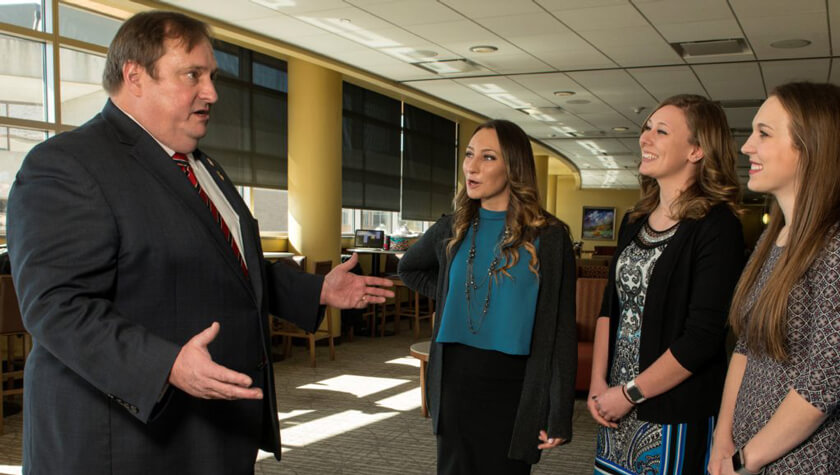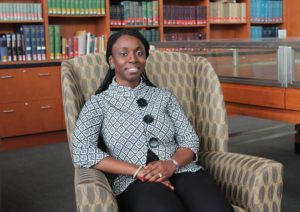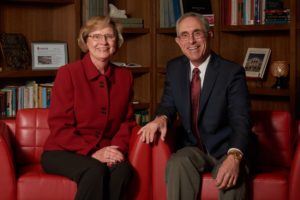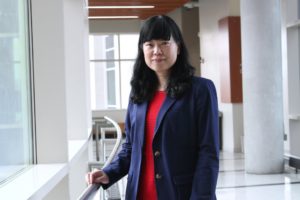
When people ask what really sustains a great PharmD program like ours, the answer is simple: The quality of the program starts with the quality of the students. We attract the best pharmacy students who are eager for the challenge of a very rigorous and demanding PharmD program led by top faculty and talented staff.
By learning at one of the best pharmacy training grounds in the world—University of Wisconsin–Madison School of Pharmacy—our PharmD students earned the third highest 2017 pass rate and first-time pass rate for the North American Pharmacist Licensure Examination (NAPLEX) in the country. With a 99% pass rate, UW–Madison School of Pharmacy significantly outperformed the national average of accredited pharmacy schools (86%) and all NAPLEX takers (82%).
Our PharmD students are exceptional, and we’re preparing them for successful careers, including residencies. Given how competitive pharmacy residencies are today, I’m proud of our student outcomes in residency placement. The School of Pharmacy had an 83% match rate — that’s 14 percentage points higher than the national average of 69% residency match rate.
Many of our PharmD students continue to win national recognition. For example, third-year PharmD student Meredith Frey was among only 10 student pharmacists across the country to be awarded an American Pharmacists Association Foundation’s 2018 student scholarship for Frey’s exceptional leadership skills and academic achievement.
Innovating for student success
A driver for this student success is the ongoing innovation in the PharmD curriculum.
Next month, we are piloting a new interprofessional learning activity with partners from the UW Center for Interprofessional Practice and Education, UW School of Medicine and Public Health, and the UW School of Nursing. This will bring together nearly 500 first-year medical, nursing, and pharmacy students to study interprofessional teamwork. The activity is one component of an evidence-based, longitudinal interprofessional education program designed to prepare every PharmD student for entry-level interprofessional collaborative practice upon graduation.
In May, we will launch a new rural-focused residency track clerkship that will make our students even more competitive for residencies and build their expertise in pharmacy practice in rural settings. This further strengthens our experiential learning programs where we offered 2,588 clerkship rotations in five states and in eight countries with 49 rotations, including 26 positions for residency track clerkships at seven sites throughout Wisconsin, in the current academic year alone.
Moreover, with the change in Wisconsin state law to allow pharmacists to administer non-vaccine injectable drugs, our PharmD students are receiving the latest non-vaccine injections training so that every graduate is fully prepared to meet patient needs for injectable medications. The training will be incorporated in the curriculum so that PharmD students are trained by the end of their second year before they start internships.
Supporting faculty research
Great students also want to come to a place where they learn from the best minds and have access to cutting-edge ideas. After all, we are the birthplace of the physical pharmacy movement in applying chemistry to pharmaceutical problems and where the School’s Pharmaceutical Experiment Station, now known as the Zeeh Station, has worked on drug discovery since 1913.

Among the many recent achievements of our faculty, here are a few current examples:
- Beth Martin, associate professor in the Pharmacy Practice Division (PPD), is inducted as a fellow in the American Pharmacists Association’s Academy of Pharmaceutical Research and Science for her exemplary professional achievements and service to the profession.
- Associate Professors Warren Rose and Susie Barnett in PPD, with Laurel Legenza, a Comparative Health Systems Global Pharmacy fellow, won the UW Fall Research Competition award for their project to develop the first interactive map of antibiotic resistance in the state.
- Olayinka Shiyanbola, assistant professor in the Social & Administrative Sciences (SAS) Division, is the first pharmacist to be appointed to serve on the National Academies of Sciences, Engineering, and Medicine Roundtable on Health Literacy.
- Shiyanbola also was awarded the Charles E. Gibbs Leadership Prize for the best paper published in Women’s Health Issues in 2017 for her research on gender disparities in cost-related medication nonadherence among patients with cardiovascular disease.
- Joining the School in March as a new faculty member, Olufunmilola Abraham, assistant professor in SAS, receives the 2018 Wiederholt Prize from the American Pharmacists Association for the best published paper in Economic, Social and Administrative Sciences. Previous recipients include Eva Vivian, professor in SAS, in 2015, and Beth Martin, Ruth Bruskiewitz, professor in the Division of Pharmacy Professional Development, and Betty Chewning, professor in SAS, in 2011.
Lingjun Li, professor in the Pharmaceutical Sciences Division at the UW–Madison School of Pharmacy - The National Institutes of Health has awarded an R01 grant to Lingjun Li, professor in the Pharmaceutical Sciences Division, for her research in Alzheimer’s disease biomarker discovery with a focus on developing a multi-disciplinary approach to enable identification of biomarkers in cerebrospinal fluids that offer improved sensitivity and specificity for diagnosis and prediction of dementia onset and progression.
Moreover, the School’s research enterprise continues to be strong with significantly more research funding in the current fiscal year to date than the same period last year. School of Pharmacy faculty were awarded 33 grants totaling $6.3 million this fiscal year since July 2017. The research grants are funded primarily by the National Institutes of Health but also from the Veterans Administration, Wisconsin Department of Health Services, foundations such as the Moore Foundation, and other sources. These projects will help us better understand basic cellular mechanisms and enable us to design new medications for the treatment of diseases.
Alumni impact on pharmacy practice
Our talented students become alumni pharmacy leaders who are hungry to be a part of something bigger than themselves, advancing the Wisconsin Idea and the practice of pharmacy. The School has an impressive track record of alumni success, with 135 years of producing the best pharmacists in the state. It’s our alumni who are advancing patient care and expanding the role of pharmacists as members of the health care team.

For example, Sue and John Sutter have been in the forefront, shaping pharmacy practice in Wisconsin through their leadership of nearly every state pharmacy organization. Named Alumni of the Year by the School’s Pharmacy Alumni Association, the Sutters exemplify the Wisconsin Idea of making a difference in the lives of patients everywhere.
Kate Hartkopf, the 2017 Young Alumnus of the Year honoree, is championing a broader role for pharmacists beyond medication management. By pushing her pharmacy practice toward population health and greater primary care at her hospital, Hartkopf is helping pharmacists expand more deeply into patient care.
Positioned for re-accreditation
With our successful alumni and strong students and faculty, the School’s PharmD program is accredited by the ACPE (Accreditation Council for Pharmacy Education). Reviewed every eight years, the School will undergo re-accreditation with a site visit from ACPE in fall 2019.
We are well positioned on accreditation requirements, and we have assembled a steering committee and self-study coordinating team to prepare for re-accreditation. This represents a significant effort to document our compliance with 25 ACPE standards in a comprehensive self-study report.
As part of the re-accreditation process, we need alumni help. The accreditation includes two standardized alumni and preceptor surveys by the AACP (American Association of Colleges of Pharmacy). The surveys will be sent to alumni from the past five years and preceptors who currently enroll students. We need your participation to achieve the minimum required survey response rate. Please look for the surveys in early May.
Our passionate alumni community, top-notch students, and world-class faculty and staff make the School of Pharmacy truly special. The accreditation process simply confirms what I already know: the best are here at Wisconsin.
On, Wisconsin!
Steven M. Swanson
Dean
